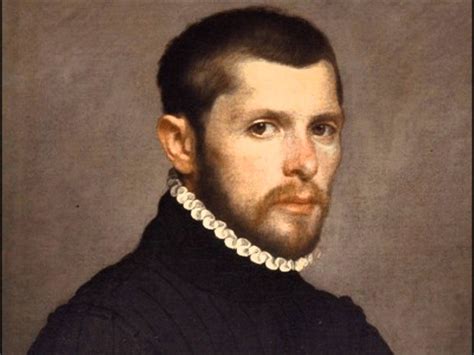William Byrd (1540-1623) was a Catholic composer whose work was widely performed in Anglican churches during a period of Catholic persecution. How a “recusant” Catholic, meaning one who refuses authority, became such a popular composer, and remained one, is one of the more interesting chapters of Western classical music.
Thus, performances of Byrd’s music are often reflect an awareness of the delicate historical and political context in which Byrd worked. From The Tallis Scholars’ 2004 recording, Playing Elizabeth’s Tune to the recent recording from the Choir of Westminster Cathedral of Byrd’s Masses for Three, Four, and Five Voices, his situation as a recusant Catholic serving Anglican monarchs figures largely in their presentation, selection, and program notes.
William Byrd, as a recusant, would not swear the oath acknowledging Elizabeth I as Supreme Governor of the Church of England and refused to attend Church of England services. His refusal could have lead to a fine, imprisonment, exile, or execution. Even more dangerously, while composing music for Elizabeth’s Chapel Royal, Byrd wrote ordinaries and propers for the secretly celebrated Catholic Masses that were forbidden by law.
Choral groups like the Tallis Scholars, Stile Antico, Harry Christophers and The Sixteen, and John Eliot Gardiner’s Monteverdi Choir, all refer to a kind of secret code in these works that only other recusant Catholics would have recognized. For example, reviewing a Tallis Scholars’ concert in Boston last December, Matthew Guerrieri wrote, “Many of Byrd’s Latin motets . . . set texts that would have held special meaning for English Catholics hoping for a restoration of the faith.”
Guerrieri cites two of the motets from the Cantiones Sacrae included in the concert program that would have held special meaning for the recusants risking punishment by attending Mass, Vigilate (Mark 13: 35-37):
“Watch ye therefore: for ye know not when the master of the house cometh, at even, or at midnight, or at the cockcrowing, or in the morning…”
Also, the motet, Ne Irascaris, Domine (Isaiah 64: 9-10).
“Be not very angry, O Lord, and remember no longer our iniquity: behold, see we are all thy people.”
For Catholics attending clandestine Masses, Vigilate could have a more immediate meaning than preparing for the Second Coming. They had to be vigilant in avoiding the Elizabethan authorities searching Catholic priests who were considered traitors just for being in England. If captured a priest would face torture and execution, as did St. Edmund Campion and St. Henry Walpole.
Byrd, in fact, composed a musical setting of a poem by Walpole who had witnessed Campion’s execution in 1581, “Why do I use my paper, pen, and ink?”who would suffer the same fate in 1595. The composer had met St. Robert Southwell and other Jesuit priests and knew the dangers they faced.
Byrd wrote other motets that conveyed subversive Catholic meanings: Tristitia et anxietas, Vide, Domine afflictionem, Tribulationes civitatem, and especially Quomodo cantibus (Psalm 136/137). These motets express the same hope of salvation heard in Verdi’s great chorus of the Hebrew slaves from his opera Nabucco: “Va, Pensiero” (“Fly, thought, on the golden wings”). Although English was the official language of Anglican services, Byrd wrote and published his music to Latin texts.
His precarious role as a composer of sacred music in Protestant England was summed up by Andrew Carwood, conductor of the Cardinall’s Musick, in an interview in The Tablet comparing Byrd’s situation to that of Shostakovich in Russia under the censorship and threats of Stalin.
William Byrd the man heroically served his faith and his Church in a time of Protestant oppression. However, it’s through his music that Byrd gave posterity his greatest gift: His setting of sacred texts begin with the words themselves, instead of using a pre-existing melody or cantus firmus, sensitively fitting his music to the intimate space of hidden chapels.
Once relieved of official duties in 1593 in service of the Church of England, Byrd composed Masses for Three, Four, and Five Voices and the Gradualia, settings of Mass propers which can be heard in the near-definitive recording by the Choir of Westminster Cathedral conducted by Martin Baker mentioned above. The Catholic choir of Westminster Cathedral, one of the finest in the world, demonstrates how the smaller sound Byrd probably envisioned can be enlarged without losing its clarity of expression.
Indeed, since the revival of Catholicism in the nineteenth-century Great Britain, Byrd’s Mass settings have been performed by larger choirs, in larger spaces, and for larger groups than Byrd probably ever imagined would hear them.
